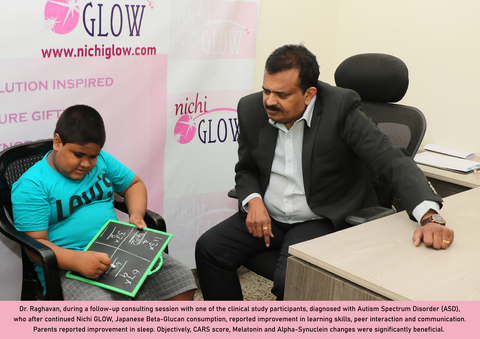Business Wire India
In the first such report, children with Autism spectrum disorder (ASD) showed improvement in behaviour, learning skills and sleep, after oral consumption of AFO-202 strain of black yeast Aureobasidium Pullulans produced Beta 1,3 -1,6 glucan (Nichi GLOW), published in BMJ Neurology Open (http://dx.doi.org/10.1136/bmjno-2021-000203). Beneficial reconstitution of gut microbiota was also reported with Nichi GLOW, which is unique from other beta glucans by its source, production method, and purity.
This press release features multimedia. View the full release here: https://www.businesswire.com/news/home/20220313005031/en/

Improvement of learning and communication skills, sleep pattern and sleep quality beside peer interaction were the major changes observed in a clinical study after a 90-day consumption of Nichi GLOW beta glucan food supplement, according to the parents of study participants. One of them demonstrated his reading, writing and mathematical skills in a follow-up consulting with Dr Raghavan, developmental pediatrician & neurologist. ß-glucans considered clearing aggregated alpha-synuclein by enhancing NK cells & as a prebiotic, control enterobacteria, a cause of the disease, thus may have potentials in tackling neurological illnesses involving gut microbiome-dysbiosis. Nichi GLOW, a safe food supplement, which does not contain any allergens are worth larger clinical studies of longer follow-up in different populations to validate as an adjunct to conventional treatment in neurodevelopmental and neurodegenerative illnesses, as gut microbiota varies with food habits also, said Dr Raghavan. (Graphic: Business Wire)
Autism is a neurodevelopmental disorder affecting 1 in 44 children in the developed world, with multiple causes and varying severity of manifestation. These children are more likely to develop neurodegenerative diseases in later life. In the study, Nichi GLOW intake improved CARS score and communication skills (https://www.youtube.com/watch?v=reJOjBMKSg4). Nichi GLOW controlled enterobacteria, a gut microbiome producing harmful proteins like curli and amyloid, leading to Alpha-synuclein misfolding and aggregation in the neurons, a cause of the disease (https://doi.org/10.1101/2021.10.26.21265505). Synucleinopathy spreading through gut-brain-axis to the brain, might cause Parkinson’s or Dementia, therefore, it’s worth studying the prophylaxis of Nichi Glucan range of products in neurodegenerative conditions, as microglia activation is one of the mechanisms of their action in brain (https://doi.org/10.1016/j.jns.2021.117554), says Dr. Raghavan, the principal investigator.
The findings were presented in a webinar commemorating Autism Sunday (https://www.ncrmniche.org/autismsunday2022/proceedings/index.html), organized by Jesuit Antonyraj memorial Inter-disciplinary Center for Advanced Recovery and Education (JAICARE). Research conducted in Japan unraveled the hidden potentials (https://doi.org/10.1101/2021.08.05.21261640), of this ß-glucan; thanks to a wholesome ecosystem in Japan aiding development of novel solutions, which together with the trans-world inter-disciplinary network of healthcare expertise of GN Corp have made this path-breaking feat possible, commented the scientists. https://sponsored.bloomberg.com/article/jco/japan-where-high-tech-meets-high-value-foreign-direct-investment
Nichi Glucan range of products were approved as food additives in Japan in 1996 and don’t contain any commonly notified allergens. They are unique, being produced as an exo-polysaccharide by novel strains of Aureobasidium Pullulans in a GMP certified facility in Japan and exported in different brands: Nichi-GLOW, Neu-REFIX, Nichi Glucan & Nichi Glucan-REFIX; not intended to diagnose, treat, cure, or prevent any disease & approval status may vary between countries. Publications are meant for academic and research initiative purposes; not to be construed as medical advice. Physicians’ advice is recommended for specific health queries.
View source version on businesswire.com: https://www.businesswire.com/news/home/20220313005031/en/
